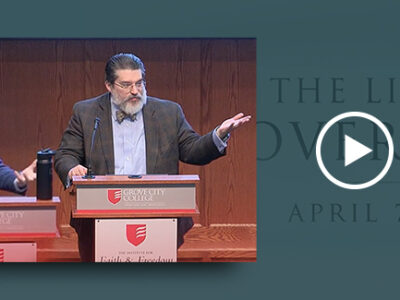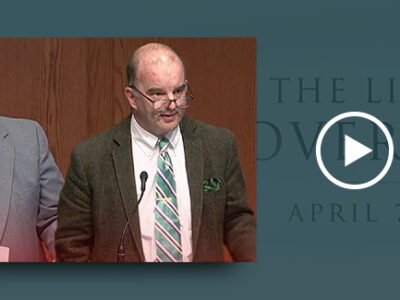Editor’s Note: The “V&V Q&A” is an e-publication from the Center for Vision & Values at Grove City College. Each issue will present an interview with an intriguing thinker or opinion-maker that we hope will prove illuminating to readers everywhere. In this latest edition, Dr. Paul Kengor, the executive director of the Center for Vision & Values, interviews Dr. John Sparks, Grove City College Dean of Liberal Arts, a long-time faculty member, an attorney, and a contributor to the upcoming April 10-11 conference, “Church & State in 2008,” to be held on the campus of Grove City College.
V&V: Dr. Sparks, among the variety of issues we’re examining in our fourth annual conference, “Church & State in 2008,” are the increasingly common and controversial disputes over church property. Your talk will be based on your conference paper, titled, “Whose Church is This? Church Property Disputes and the Civil Courts.” Tell us how and when this emerged as an issue.
Dr. John Sparks: There have been a variety of differences that have spawned church-property disputes. The most recent disputes have arisen largely over the issue of the ordination of homosexuals. For example, the 11 churches in Virginia that have voted to leave The Episcopal Church (TEC) have done so because of the ordination of Gene Robinson as bishop of New Hampshire when Robinson was a declared homosexual who lived with a same-sex partner. Perhaps a more accurate way to say it is that these churches see the ordination of Robinson as a willingness by the TEC to ignore Scriptural admonitions against homosexuality that are clear and have been traditionally followed.
V&V: It is interesting that it was a moral issue like slavery that led to many of these initial property conflicts and, indeed, it is once again moral issues that are causing a rift today. What are those moral issues today? Does one or two stand out?
Sparks: The immediate issue is certainly what one would call a moral issue. Human sexuality is the subject of God’s Word because God made man and woman according to a unique plan. Therefore, to ignore God’s intentions in regard to sexuality is to take issue with Him about how He created humans. Now, although human sexuality seems to be the most obvious immediate issue, the fundamental issue is how the TEC views the Holy Scriptures. The seceding churches are saying that their parent denomination is not taking the Word of God seriously.
V&V: And this has become a bigger issue for some denominations (like TEC) as opposed to others. Which denominations?
Sparks: Church-property disputes have arisen more commonly in denominations that are organized in a more hierarchical structure. “Church government” is the way churches are organized—that is, governed. Put simply, there are three basic forms of church government: congregational, Episcopal and Presbyterian. Congregational government allows the local church and its members to act largely autonomously. The congregation is independent of any higher temporal authority. Disputes in congregational churches are internal arguments among disagreeing members. The other two forms, again simply put, have a series of higher bodies which assert certain kinds of authority over the local congregations. So, in the Episcopal form, the diocese and bishops may subject a local congregation to discipline. In the Presbyterian form of government, the presbytery, the synod, and the general assembly review, and may effectively veto, the actions of a local congregation. In these latter two forms, the disputes may well arise between the local congregation and the larger denominational bodies over doctrinal matters. That is what has happened in Virginia and a number of other locations when the denomination went in directions with which a local congregation strongly disagreed.
V&V: It is also interesting how these frictions are international in nature. For the Episcopal Church, for instance, America and Africa are at odds. Explain this unique case.
Sparks: Here is an example: The African Anglican Church of Nigeria, whose bishop is Peter Akinola, is scripturally anchored on questions of sexual practice and morality. Its U.S. counterpart, The Episcopal Church, by contrast, has accepted current secular views of sexuality which regard homosexuality as merely a personal preference. The Virginia Episcopal churches have, therefore, decided to stay within the broad umbrella of Anglicanism, which umbrella is called the Anglican Communion, by submitting to a bishop elsewhere in the world whose commitment to Scripture, and the sexual practices derived from it, is like their own.
V&V: These debates are also regional in nature, meaning regions within the United States. Of interest to a lot of people in our area of Western Pennsylvania is the rupture within Presbyterian Church USA (PCUSA). What’s happening there?
Sparks: In Western Pennsylvania, one could refer to two local churches which have received some attention for their determination to withdraw from the Presbyterian Church USA (PCUSA). I am thinking of Beverly Heights and Memorial Park, both in the Pittsburgh area. My information is that both have navigated out of their former affiliation with the PCUSA and joined another newly formed denomination—the Evangelical Presbyterian Church (EPC). Although a lawsuit was begun in one case, both have come to a settlement with their presbyteries about the local church property. Usually these settlements include an agreement by the local congregation to make a payment to the denomination. Such a solution has the distinct advantage of ending public adversity and sometimes rancor between Christians.
V&V: So, how on earth do the courts navigate these waters? What takes precedent, a previous U.S. Supreme Court ruling or the Westminster Confession?
Sparks: There are two approaches which have been endorsed by the U.S. Supreme Court as consistent with the rule against establishment of religion and in favor of free exercise of religion found in the First Amendment. In other words, state civil courts, where church-property disputes are filed, may use either of these interpretative approaches to settle the dispute. One is called the “deference” approach, and simply means that when presented with lawsuits involving schisms within hierarchical churches, the determinations of the highest church tribunal must be deferred to by the civil courts. Of course, this means that in virtually all cases, the local congregation loses its property if the law court adopts this approach. The second approach is called the “neutral principles” of law approach, and it means that the civil-law court hearing a property dispute between a local congregation and its denomination is permitted to use the language of property deeds, the terms of local church charters, and state statutes to determine the outcome. This approach is less likely to favor one side or the other.
V&V: What do you recommend as the best solution at this point?
Sparks: First, local churches that are part of larger ecclesiastical bodies should make sure that they pay attention to denominational pronouncements about church property. For example, in 1979, The Episcopal Church adopted something called the Dennis Canon, which purported to claim all local church properties as being held “in trust” by and for the denomination. Local churches should have responded to this, if they were concerned about the denomination going doctrinally awry, by repudiating the Dennis Canon in their own organizational documents. Secondly, once a dispute arises that is likely to lead to the secession of the local church; the churches should negotiate a settlement. The two approaches are simply too likely to produce an outcome unfavorable to the local church. Many denominational bodies, recognizing that local churches will be leaving them, have developed protocols for leaving the denomination. Those I have read are not unreasonable, though some monetary payment is part of the exodus process.
V&V: Dr. Sparks, we look forward to hearing your talk at the conference. Thanks for chatting with us.
Sparks: My pleasure.




